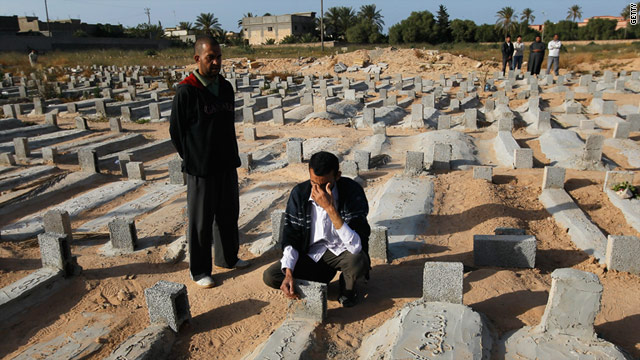Italy, France sending troops to advise Libyan rebels
April 20, 2011 -- Updated 1315 GMT (2115 HKT)
Will there be military intervention in Libya on humanitarian grounds?
STORY HIGHLIGHTS
- NEW: Italy is sending troops to advise rebels in self-defense
- France and Britain are sending military advisers as well
- U.N. human rights chief says the attacks in Misrata could constitute international crimes
- UNICEF says 20 children have been killed and many more injured in Misrata
- A rebel spokesman says he does not want international fighters joining rebels
Tripoli, Libya (CNN) -- France and Italy announced Wednesday that they will send military officers to advise rebels fighting for the ouster of Libyan leader Moammar Gadhafi's regime.
Following a similar announcement by the British government Tuesday, French government spokesman Francois Baroin said a "small number" of French troops were being sent to advise the rebels' Transitional National Council.
French Defense Minister Gérard Longuet again ruled out sending ground troops to fight alongside the rebels. "This is a real issue that deserves an international debate," he said, adding, "We are working within the framework of the 1973 resolution," a reference to the U.N. resolution that authorized action in Libya. "You cannot please everyone all the time," he said.
Italy will send military advisers to train the rebels in self-defense tactics, Italian Foreign Ministry spokesman Maurizio Massari announced.




Britain said Tuesday it is sending a contingent of experienced military officers to the rebel stronghold of Benghazi in an advisory role. The team will work with the Transitional National Council on how the opposition can improve military organizational structures, communications and logistics, the British Foreign Office said. It will also assist in the delivery of critically needed aid.
"This deployment is fully within the terms of UNSCR 1973 both in respect of civilian protection and its provision expressly ruling out a foreign occupation force on Libyan soil," Foreign Secretary William Hague said.
The efforts to bolster the rebellion come as Libya's main opposition body pleaded for an international military intervention.
Libyans are "being slaughtered every day by the Gadhafi forces," rebel spokesman Shamsiddin Abdulmolah told CNN Tuesday.
The U.N. High Commissioner for Human Rights Wednesday said some of the Libyan government's attacks on the besieged city of Misrata could constitute international crimes.
A statement from Navi Pillay's office said she condemned "the reported repeated use of cluster munitions and heavy weaponry by Libyan government forces in their attempt to regain control of the besieged city of Misrata, and said that such attacks on densely populated urban areas, resulting in substantial civilian casualties, could amount to international crimes."
"The pro-government forces besieging the city, including their commanders and all other personnel, should be aware that -- with the International Criminal Court investigating possible crimes -- their orders and actions will be subject to intense scrutiny," Pillay said in the statement. "Under international law, the deliberate targeting of medical facilities is a war crime, and the deliberate targeting or reckless endangerment of civilians may also amount to serious violations of international human rights law or international humanitarian law."
UNICEF, the U.N. children's agency, said Wednesday that 20 children have been killed and "countless others injured" in Misrata alone.
Among rebels, calls for help have been increasing each day.
Aid agencies are afraid of going to areas such as Misrata, which is being targeted by Gadhafi troops daily, opposition activist Mohamed Ibrahim said. "Some of them, they come. But most of them, they come near ... they hear the shelling and everything and they go back," he said.
At least 27 people have been killed and 142 have been injured this week, according to an opposition spokesman who wanted to be identified only as "Mohammed" for safety reasons.
Aid groups have been attempting to pluck desperate people from Misrata, which is hemmed in by Gadhafi's forces on three sides.
The only escape route is by the city's port -- an area witnesses said has also been shelled by Gadhafi's forces.
For those left behind, witnesses say, the dire situation continues to deteriorate. The city is still without water, electricity, and telecommunications, Mohammed said Tuesday. "Shelling has moved out of the industrial areas to the residential areas, and it is still going on."
Rebel spokesman Abdulmolah said the opposition's Transitional National Council is not opposed to a humanitarian mission on the ground.
"Something needs to be done so we can stop the bloodshed of our people," he said.
But "we do not want any foreign military presence or any international fighters along with our rebels," he added.
NATO is leading an international military operation that includes targeting Gadhafi's military resources with airstrikes.
NATO said the operation has destroyed seven ammunition bunkers in the Tripoli area as well as equipment in several other parts of the country this week.
NATO attacked three regime battle tanks and a vehicle-mounted artillery piece in and around Misrata on Tuesday, British military spokesman Maj. Gen. John Lorimer said in a statement Wednesday.
Abdulmolah said NATO strikes may have also prevented more destruction in eastern Libya, particularly near Benghazi.
"We received reports that Gadhafi forces were mobilizing their troops and their mobile missiles/rockets systems from Brega towards Ajdabiya to bomb Benghazi. They were stopped by (Tuesday's) NATO strikes," he said.
But he said the opposition wants "technical assistance" and weapons "because we are facing a merciless tyrant who wants to slaughter his own people just because they asked for freedom and liberty."
CNN's Saad Abedine, Andreena Narayan, Reza Sayah, Yousuf Basil and Ben Wedeman contributed to this report.


No comments:
Post a Comment